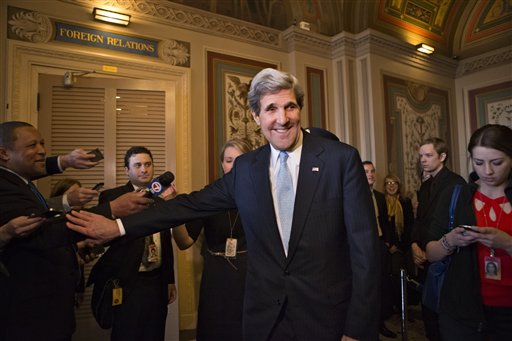WASHINGTON — The Senate Foreign Relations Committee on Tuesday swiftly and unanimously approved President Barack Obama’s choice of Sen. John Kerry to succeed Hillary Rodham Clinton as secretary of state.
By voice vote, the panel approved the nomination of the five-term Massachusetts Democrat, who has been a member of the committee for 28 years and led it for the past four. The full Senate planned to vote Tuesday afternoon.
Kerry did not attend the session in the ornate diplomatic room in the Capitol. In his absence, Democrats and Republicans praised him and remarked on his extensive grasp of the issues during his confirmation hearing last Thursday.
“Long-winded,” joked Sen. John McCain, R-Ariz., a Kerry friend who had introduced the senator at that hearing.
Sen. Bob Menendez, D-N.J., who succeeds Kerry as committee chairman, said the senator would be a “formidable secretary of state.”
Obama chose Kerry, 69, the son of a diplomat, decorated Vietnam veteran and 2004 Democratic presidential candidate, to succeed Clinton, who is stepping down after four years. The senator had pined for the top diplomatic job that went to Clinton after Obama’s 2008 election.
Kerry has served as Obama’s unofficial envoy, soothing relations with leaders in Afghanistan and Pakistan.
The ease with which the Senate is acting on Kerry’s nomination is certain to disappear with Obama’s two other national security nominees — former Sen. Chuck Hagel, a Republican nominated for defense secretary, and John Brennan, Obama’s pick for CIA director.
Hagel faces strong opposition from some of his former GOP colleagues who question his support for reductions in the nuclear arsenal and cuts in defense spending. Lawmakers also have questioned whether he is sufficiently supportive of Israel and strongly opposed to any outreach to Iran.
Democrats have rallied for Hagel, and he has the announced support of at least a dozen members in advance of his confirmation hearing on Thursday. Six Republicans have said they would vote against him, with some opposing Obama’s choice even before the president’s announcement.
Brennan faces questions from the GOP about White House leaks of classified information and from Democrats about the administration’s use of drones.
Sen. Lindsey Graham, R-S.C., threatened to block the nomination of both men until he gets more answers from the Obama administration about the deadly assault on the U.S. diplomatic mission in Libya that killed Ambassador Chris Stevens and three other Americans.
Graham, who earlier this month signaled he would delay Brennan’s pick, said in an interview Monday night with Fox News’ “On the Record” the he would “absolutely” block Hagel unless Defense Secretary Leon Panetta testifies about the attack in Benghazi, Libya.
Clinton testified for more than five hours last Wednesday before the House and Senate, but that wasn’t sufficient for Graham.
“Hillary Clinton got away with murder, in my view,” he said. “She said they had a clear-eyed view of the threats. How could you have a clear-eyed of the threats in Benghazi when you didn’t know about the ambassador’s cable coming back from Libya?”
Senate Armed Services Committee Chairman Carl Levin, D-Mich., told reporters Tuesday that a hearing with Panetta on Libya is planned though the date was uncertain. Graham welcomed that news and said he would not thwart a committee vote on the nomination.
“Happy as a clam, news to me,” he said.
As a White House emissary, Kerry has tamped down diplomatic fires for Obama. He also has stepped ahead of the administration on a handful of crises. He joined McCain as an early proponent of a more aggressive policy toward Libya, pushing for using military forces to impose a “no-fly zone” over Libya as Moammar Gadhafi’s forces killed rebels and citizens.
He was one of the early voices calling for Egyptian President Hosni Mubarak to step down as the revolution roiled the nation two years ago.
During his tenure, Kerry has pushed for reducing the number of nuclear weapons, shepherding a U.S.-Russia treaty through the Senate in December 2010, and has cast climate change as a national security threat, joining forces with Republicans on legislation that faced too many obstacles to win congressional passage.
He has led delegations to Syria and met a few times with President Bashar Assad, now a pariah in U.S. eyes after months of civil war and bloodshed as the government looks to put down a people’s rebellion. Figuring out an end-game for the Middle East country would demand all of Kerry’s skills.
The selection of Kerry closes a political circle with Obama. In 2004, it was White House hopeful Kerry who asked a largely unknown Illinois state senator to deliver the keynote address at the Democratic convention in Boston, handing the national stage to Obama. Kerry lost that election to President George W. Bush. Four years later, Obama was the White House hopeful who succeeded where Kerry had failed.
Kerry would be the first man to fill the secretary of state job since Colin Powell eight years ago. Condoleezza Rice served as secretary of state in President George W. Bush’s second term, and Clinton has held the post in Obama’s first term.
Send questions/comments to the editors.



Comments are no longer available on this story